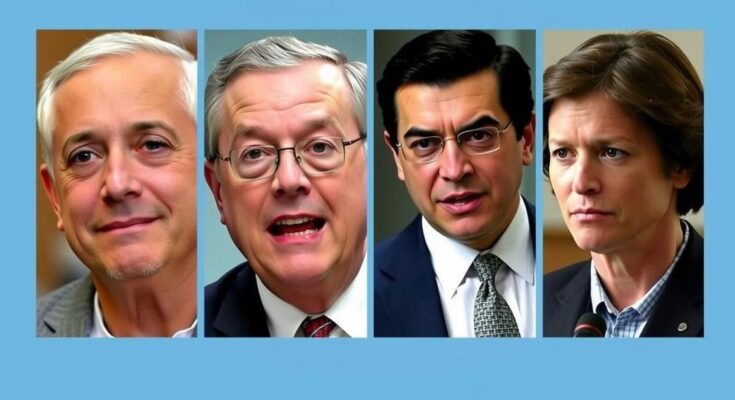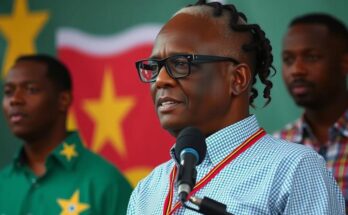The diplomatic crisis surrounding six Venezuelan opposition figures in the former Argentine embassy intensifies due to escalated harassment from the Maduro regime, amid demands from Argentina, Brazil, and the OAS for their safe passage. The crisis is rooted in the contested presidential election results from July 2024, deepening the political divide and prompting international responses to the urgent humanitarian situation.
The situation in Venezuela has intensified as six opposition figures have found refuge in the former Argentine embassy, facing increasing harassment and threats from Nicolas Maduro’s government. These individuals report severe deterioration in their living conditions, marked by persistent surveillance and utility disruptions. In response, Argentina, Brazil, and the Organization of American States (OAS) are advocating for their safe passage, amidst the backdrop of a disputed presidential election that has exacerbated Venezuela’s political turmoil. The Maduro administration, however, continues to dismiss these allegations, raising concerns about adherence to international diplomatic norms as tensions escalate further.
As of March 2024, the opposition figures, having fled due to political persecution, initially sought protection from Argentina but later fell under Brazilian oversight until September when Maduro revoked this authority. Their plight is characterized by constant surveillance by armed personnel and deliberate cuts to essential services such as water and electricity, further complicating their living conditions.
Recent developments have escalated tensions; local staff members of the diplomatic compound have been arrested, suggesting a significant increase in the aggressiveness of Maduro’s regime. Magalli Meda, one of the opposition leaders, proclaimed, “We are seeing how the process of violating our basic human rights is accelerating.”
The backdrop to this crisis includes the contentious presidential election held in July 2024, which has deepened the political divide in the country. The National Electoral Council, viewed as aligned with Maduro, declared him the winner amid accusations of fraud, while the opposition argues they possess evidence proving their candidate received greater support.
Argentina’s government has actively sought to rally international support for the safe transportation of the opposition figures, urging the OAS to apply diplomatic pressure on Venezuela. In a significant demonstration of solidarity, numerous OAS member states have supported Argentina’s initiatives. Concurrently, Brazil, under President Luiz Inácio Lula da Silva’s guidance, has also engaged in negotiations concerning the broader political situation in Venezuela, despite challenges in maintaining oversight of the compound.
The safety of the opposition members and the autonomy of the diplomatic compound are at an unprecedented risk, as the Maduro regime continues to assert pressure. Foreign affairs representatives emphasize the importance of diplomatic premises under international law, yet practical compliance is lacking, challenging the legitimacy of government actions in contravention of established norms.
As voiced by Pedro Urruchurtu, one of the sheltering members, urgent action is necessary to prevent further deterioration of the situation: “We ask Brazil and others to redouble their efforts, understanding that this situation can worsen. It demands the attention of the entire region.”
In summary, the plight of these Venezuelan opposition figures not only raises urgent humanitarian concerns but also highlights the complexities of international diplomacy in the face of increasingly authoritarian regimes. A concerted effort from regional actors is crucial to navigate the intricate landscape of Venezuelan politics and secure the well-being of the individuals in distress. The resolution of the crisis requires a sustained diplomatic commitment to uphold international standards and protect fundamental human rights.
The ongoing Venezuelan political crisis stems largely from the highly contentious presidential election held on July 28, 2024, which has prompted violent clashes between the government and opposition groups. Following the disputed election results, where the National Electoral Council announced Nicolas Maduro as the winner without transparent vote counts, opposition figures accused the government of electoral fraud. Amid these tensions, six members of the opposition sought refuge in the former Argentine embassy in Caracas, fearing for their safety due to government persecution. This situation has attracted the attention of regional governments, notably Argentina and Brazil, alongside the Organization of American States, in their call for the safe exit of these opposition figures.
The situation regarding the six Venezuelan opposition figures sheltered in the former Argentine embassy highlights both the severe implications of political dissent in Venezuela and the ongoing struggle for human rights amid governmental repression. As international pressure mounts on Maduro’s regime from Argentina, Brazil, and the OAS, the urgency for securing the safe passage of these individuals reflects broader concerns over the deterioration of democratic practices in Venezuela. A swift diplomatic resolution is imperative to ensure the safety and rights of those under threat, promoting a peaceful resolution to the escalating crisis.
Original Source: www.newslooks.com



